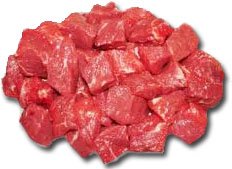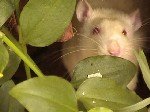07th Jul 2011
Not All ‘Whole Foods for Pets’ are Really Whole!

I can’t believe it, but yet again we were way ahead of the curve when we came up with our tag line, “Whole Foods for the Whole Animal.”
I must admit that it wasn’t very hard to come up with this tag line, given that our pet foods contain nothing but food, i.e., no fragments, such as refined grains, or synthetics like the typical vitamin/mineral premixes found in many other brands of pet food.
Over the past six years, the competition has been concentrating on adjusting their public relation materials, i.e., ads and website ‘information,’ to fit continuously morphing sales-promoting trends like the all too common (and loose) use of the terms, ‘natural,’ ‘holistic,’ ‘raw,’ ‘organic,’ and ‘green.’ *
Now, the competition has hit upon the trendy search engine key phrase, ‘whole food for pets’ and has adopted the ‘whole food’ claim to market their own pet foods, even though many of these products are the furthest thing from ‘whole’ you could imagine.
Personally, I think it’s more than a bit disconcerting to see a ‘whole food’ claim used for any pet food product that lists among its ingredients refined ingredients or isolated, synthetic nutrients such as genetically engineered vitamins.
For example, look out for an ‘organic grain’ claim applied to [non-certified organic] dog foods which now are highly ranked in a ‘whole food for pets’ internet search. If you add the terms ‘organic,’ ‘raw,’ or even ‘human-grade,’ you would almost certainly come across some listings of products for which none of these claims are true.
In addition to the dishonest embedding of search terms that have little or nothing to do with some pet food products being marketed on the internet, another troubling trend among pet food manufacturers is the prevalent use of grains in the formulation of pet foods. Putting aside the fact that dogs didn’t evolve to eat grains, the term, ‘grains,’ as employed by some manufacturers probably refers to refined flour, an ingredient that isn’t particularly healthy for either humans or their dogs.
Why might a company describe their refined flour ingredient as ‘grains?’ My experience, both as a researcher who follows trends in animal nutrition and a pet food manufacturer who uses organic whole grain flours for pet rodent foods, tells me that this is a simple case of looking after the ‘bottom line.’ Whole grain flours are much more expensive than their refined grain (or ‘white’) versions. And, of course, USDA certified organic grains are even more expensive than their conventional (i.e., non-organic) whole grain versions.
I would simply shrug off these new exploitative—and less than truthful—trends IF these pet food claims were harmless and didn’t have the potential to hurt pets and the guardians who love them. The sad truth is that such deceptions undermine the organic, green, and whole food movements because of their intent to blur the line between the truth and fake, sales-driven claims. Moreover, they make it impossible for many consumers to find and purchase what they’re actually looking for to support the health of their pets.**
It’s unfortunate that such patently false claims can be made with near-total impunity. The only salient consequences seem to be increased sales for the purveyors of these claims and poor nutrition and overall bad health for the pets that are fed falsely represented food products.
Yet again, it seems that it’s up to consumers to educate themselves properly. All available information about a given product should be checked carefully, and information provided by pet food manufacturers should be considered as dubious if there isn’t an independent, unbiased third-party backing it up (and, of course, the positions taken by retailers can’t necessarily be taken at face value because they obviously want to sell the products they carry). I know that the sentiment I express here isn’t one the pet food industry as a whole appreciates. What can I say? Somebody needs to give pet guardians the ‘heads-up.’ So…well…I volunteer!
I’m compelled to repeat an old line of mine: “The most regulated pet foods are certified organic.” Our USDA-accredited organic certifier has access to every single ingredient we buy and every processing step to which we expose all of our ingredients.
Organic certification of pet foods is done voluntarily to the benefit of the consumer, as it assures them that an unbiased third party has verified the claims that the manufacturer makes about their products.
———–
* Don’t forget that only certified organic pet food claims are regulated, none of the other widely used claims (e.g., natural, green, holistic and even non-certified organic ones) are, which allows for and explains their wide-spread abuse.
** Don’t forget that refined grains have been implicated in a number of common chronic pathologies, including obesity, diabetes, inflammation, and cancer. Other non-whole ingredients, such as isolated, synthetic or GMO vitamins and minerals, can accumulate in the body to disease-causing proportions, cause allergies and likely other, as yet unidentified, problems in pets.
It’s certainly true that some pets (particularly older ones) require supplemental nutrients. But nowadays, there are many food-based alternatives available, though these might not be marketed specifically for pets. If in doubt, consult your veterinarian before you choose a natural nutrient over the synthetic supplements your pet may have been taking.

I can’t believe it, but yet again we were way ahead of the curve when we came up with our tag line, “Whole Foods for the Whole Animal.”
I must admit that it wasn’t very hard to come up with this tag line, given that our pet foods contain nothing but food, i.e., no fragments, such as refined grains, or synthetics like the typical vitamin/mineral premixes found in many other brands of pet food.
Over the past six years, the competition has been concentrating on adjusting their public relation materials, i.e., ads and website ‘information,’ to fit continuously morphing sales-promoting trends like the all too common (and loose) use of the terms, ‘natural,’ ‘holistic,’ ‘raw,’ ‘organic,’ and ‘green.’ *
Now, the competition has hit upon the trendy search engine key phrase, ‘whole food for pets’ and has adopted the ‘whole food’ claim to market their own pet foods, even though many of these products are the furthest thing from ‘whole’ you could imagine.
Personally, I think it’s more than a bit disconcerting to see a ‘whole food’ claim used for any pet food product that lists among its ingredients refined ingredients or isolated, synthetic nutrients such as genetically engineered vitamins.
For example, look out for an ‘organic grain’ claim applied to [non-certified organic] dog foods which now are highly ranked in a ‘whole food for pets’ internet search. If you add the terms ‘organic,’ ‘raw,’ or even ‘human-grade,’ you would almost certainly come across some listings of products for which none of these claims are true.
In addition to the dishonest embedding of search terms that have little or nothing to do with some pet food products being marketed on the internet, another troubling trend among pet food manufacturers is the prevalent use of grains in the formulation of pet foods. Putting aside the fact that dogs didn’t evolve to eat grains, the term, ‘grains,’ as employed by some manufacturers probably refers to refined flour, an ingredient that isn’t particularly healthy for either humans or their dogs.
Why might a company describe their refined flour ingredient as ‘grains?’ My experience, both as a researcher who follows trends in animal nutrition and a pet food manufacturer who uses organic whole grain flours for pet rodent foods, tells me that this is a simple case of looking after the ‘bottom line.’ Whole grain flours are much more expensive than their refined grain (or ‘white’) versions. And, of course, USDA certified organic grains are even more expensive than their conventional (i.e., non-organic) whole grain versions.
I would simply shrug off these new exploitative—and less than truthful—trends IF these pet food claims were harmless and didn’t have the potential to hurt pets and the guardians who love them. The sad truth is that such deceptions undermine the organic, green, and whole food movements because of their intent to blur the line between the truth and fake, sales-driven claims. Moreover, they make it impossible for many consumers to find and purchase what they’re actually looking for to support the health of their pets.**
It’s unfortunate that such patently false claims can be made with near-total impunity. The only salient consequences seem to be increased sales for the purveyors of these claims and poor nutrition and overall bad health for the pets that are fed falsely represented food products.
Yet again, it seems that it’s up to consumers to educate themselves properly. All available information about a given product should be checked carefully, and information provided by pet food manufacturers should be considered as dubious if there isn’t an independent, unbiased third-party backing it up (and, of course, the positions taken by retailers can’t necessarily be taken at face value because they obviously want to sell the products they carry). I know that the sentiment I express here isn’t one the pet food industry as a whole appreciates. What can I say? Somebody needs to give pet guardians the ‘heads-up.’ So…well…I volunteer!
I’m compelled to repeat an old line of mine: “The most regulated pet foods are certified organic.” Our USDA-accredited organic certifier has access to every single ingredient we buy and every processing step to which we expose all of our ingredients.
Organic certification of pet foods is done voluntarily to the benefit of the consumer, as it assures them that an unbiased third party has verified the claims that the manufacturer makes about their products.
———–
* Don’t forget that only certified organic pet food claims are regulated, none of the other widely used claims (e.g., natural, green, holistic and even non-certified organic ones) are, which allows for and explains their wide-spread abuse.
** Don’t forget that refined grains have been implicated in a number of common chronic pathologies, including obesity, diabetes, inflammation, and cancer. Other non-whole ingredients, such as isolated, synthetic or GMO vitamins and minerals, can accumulate in the body to disease-causing proportions, cause allergies and likely other, as yet unidentified, problems in pets.
It’s certainly true that some pets (particularly older ones) require supplemental nutrients. But nowadays, there are many food-based alternatives available, though these might not be marketed specifically for pets. If in doubt, consult your veterinarian before you choose a natural nutrient over the synthetic supplements your pet may have been taking.
 Posted by Heidi Junger, PhD under
Posted by Heidi Junger, PhD under  Holistic Pet Food, Organic Pet Food Standards
Holistic Pet Food, Organic Pet Food Standards  Comments Off
Comments Off


 healthiest pet foods available. The term ‘holistic pet food’ floods the marketing materials of some very good—and not-so-good—pet food manufacturers and pet supply retailers. If you perform a Google search using the phrase ‘holistic pet food,’ you’ll get back about 425,000 results. But, the question still remains, what is the definition of ‘holistic’ and how is this term being applied in the pet food industry?
healthiest pet foods available. The term ‘holistic pet food’ floods the marketing materials of some very good—and not-so-good—pet food manufacturers and pet supply retailers. If you perform a Google search using the phrase ‘holistic pet food,’ you’ll get back about 425,000 results. But, the question still remains, what is the definition of ‘holistic’ and how is this term being applied in the pet food industry?
